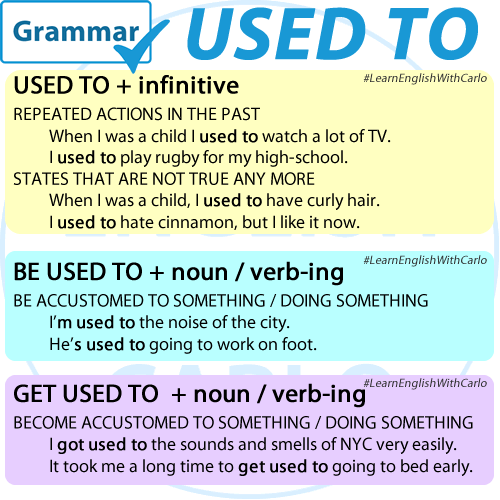In English, expressions like “used to” and “be used to” can be confusing because they look similar but have distinct meanings and uses. This guide will help you understand the difference and use them correctly.

What Does “Used To” Mean?
“Used to” is used to talk about habits, actions, or states that were true in the past but are no longer true. It highlights a contrast between the past and the present.
Structure:
- Used to + base verb (infinitive without “to”)
Examples:
- I used to play soccer every weekend, but now I don’t.
- She used to live in London, but now she lives in Paris.
- There used to be a cinema in this area, but it was demolished.
Key Point: “Used to” can describe past habits (repeated actions) or states (conditions).
What Does “Be Used To” Mean?
“Be used to” means being accustomed to something or finding it familiar, usually through experience. It does not refer to the past but rather describes a state of familiarity in the present.
Structure:
- Be used to + noun/gerund (verb + ing)
Examples:
- I am used to cold weather because I grew up in Canada. (Noun)
- He is used to waking up early for work. (Gerund)
Why Gerunds? When “be used to” is followed by an action, the verb must be in gerund form because “to” functions as a preposition in this expression.
What Does “Be Used To” Mean?
“Be used to” means being accustomed to something or finding it familiar, usually through experience. It does not refer to the past but rather describes a state of familiarity in the present.
Structure:
- Be used to + noun/gerund (verb + ing)
Examples:
- I am used to cold weather because I grew up in Canada. (Noun)
- He is used to waking up early for work. (Gerund)
Why Gerunds? When “be used to” is followed by an action, the verb must be in gerund form because “to” functions as a preposition in this expression.
Key Differences Between “Used To” and “Be Used To”
| Feature | Used To | Be Used To |
|---|---|---|
| Describes actions | Yes | No |
| Describes states | Yes | Yes |
| Focus | Past habits or states no longer true | Familiarity or adaptation |
| Structure | Used to + base verb | Be used to + noun/gerund |
| Example | She used to live in New York. | She is used to living in New York. |
Common Mistakes to Avoid
- Confusing the Two Expressions:
- Incorrect: I used to waking up early.
- Correct: I am used to waking up early.
- Using “Would” Instead of “Used To” for States:
- Incorrect: She would live in London.
- Correct: She used to live in London.
Here are a few exercises to test your understanding:
- Fill in the blanks with the correct expression (used to or be used to):
- When I was a child, I ______ (ride) my bike to school every day.
- He ______ (live) in a small town, so he finds city life overwhelming.
- We ______ (study) late at night, so staying up doesn’t bother us now.
- Identify whether the sentence refers to the past or present:
- She is used to spicy food.
- They used to go camping every summer.
Quick Summary
| Expression | Use | Example |
| Used to | Past habits or states no longer true | I used to drink coffee every day. |
| Be used to | Familiarity or adaptation | I am used to drinking tea now. |
Understanding and practicing these expressions will help you express yourself more clearly and confidently in English. Keep practicing, and soon you’ll find them second nature!
